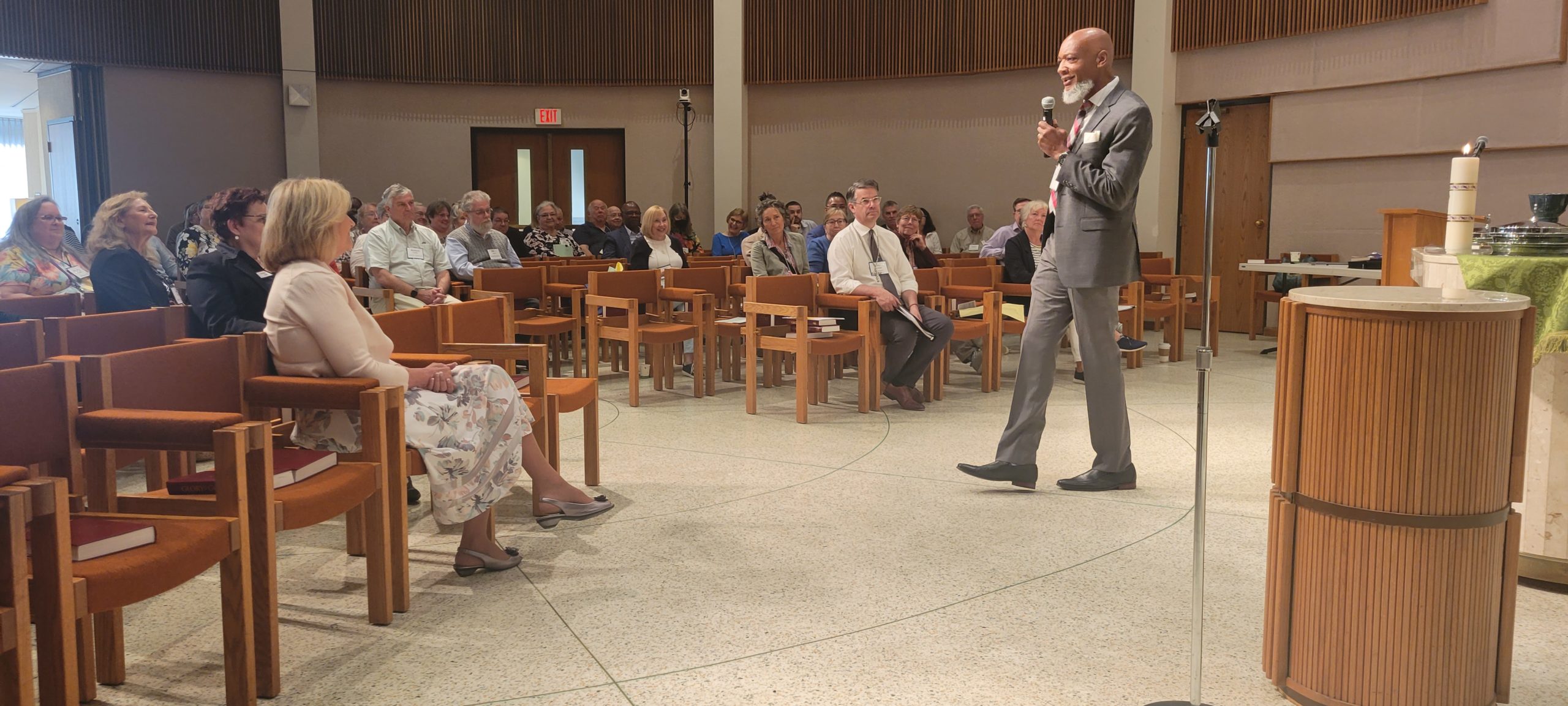
The Stated Meeting was hosted by the First Presbyterian Church of Lansing. The Rev. Paul Timothy Roberts, president of the Johnson C. Smith Theological Seminary was our guest preacher. The meeting theme, Make Use of Our Hands, focused on anti-racism work within the presbytery and our individual communities. Other highlights of the meeting included:
Worship
- Reflections on Matthew 14: 3 – 19, You Do It
by Rev. Paul Timothy Roberts, President of the Johnson C. Smith Theological Seminary - Celebration of the Lord’s Supper
Rev. Stanley Jenkins and Elder Prince Solace - Receipt of more than $1,000 to support theological education at Johnson C. Smith Theological Seminary
Recognition
- Of new Teaching Elders, Rev. Mary Austin (Validated Ministry), Rev. Lorenzo Small (Battle Creek First), and Rev. Dr. Philomena Ofori-Nipaah (Grand Rapids North Park)
Received
- Report from Synod of the Covenant by Rev. Dr. Chip Hardwick, Synod Executive
- Report of Board of Pensions by Rev. Luke Choi
- Report of the Nominating & Representation Committee by Elder Fred Welch
- Report of the Budget & Finance Committee by Elder David Logan
Approved
- Seating of Corresponding Members
- Docket
- Consent Agenda
Workshops
- (P)Repairing for Reparations: Making Common Sense Out the Common – Presented by the Rev. Jermaine Ross-Allam, director of the Presbyterian Mission Agency’s Center for Repair of Historical Harms (CRHH). Participants gained historical understanding of public opinion about reparations in the church, state and society while learning why U.S. American Protestants in particular must make the 21st century the dawn of a new era characterized by routine, common sense repair and Reparations.
- Some thoughts from the Rev. Chrissy Westbury, the presbytery’s associate presbyter, after she attended the workshop:
Rev. Ross-Allam defined reparations as “an act of a nation state or states in response to a call” and repair as the work of the people, preparing the people to inspire the nation and its leaders to make reparations.” The church, he said, is called to the work of repair and that repair requires self-reflection and environmental transformation. We must ask ourselves, what do we declare about God, about human beings, and about ourselves.
“Repair is specific and community focused,” Rev. Ross-Allam said. Repair is not the same as Diversity, Equity and Inclusion (DEI) or anti-racism work, which tends to have a broader view. Instead, it focuses on specific harms and specific restitution.
Rev. Ross-Allam recommended that anyone interested in learning more about reparations, and the history and necessity of this work, read From Here to Equality by William A. Darity, Jr. and look for resources on the Seven Stations of Repair, coming soon from the CRHH.
- Some thoughts from the Rev. Chrissy Westbury, the presbytery’s associate presbyter, after she attended the workshop:
- For the Healing of the Nation – Presented by the Rev. Paul Timothy Roberts, president of the Johnson C. Smith Theological Seminary, the only PC(USA) historically Black seminary. Participants talked through historic societal harms and biblical imperatives for societal repair and healing.
- Some thoughts from the Rev. Peggy Casteel-Huston, a member at large, after she attended the workshop:
I appreciated this workshop very much because, to be truthful, I am trying to learn more about the topic myself.
The conversation with Rev. Roberts and those attending the workshop helped me to realize that the discussing reparations from the pulpit is quite challenging for some pastors.
I appreciated how Rev. Roberts used the biblical story of Jacob and Esau as they came back together and made peace with one another as a biblical example of reparations. In the conversation, Rev. Tony Patrick also offered the teaching on Jubilee as another example.
Rev. Roberts said that he is aware the word “reparations” has a lot of political overtones to it and so using words like repair and restore may provide a better way to help people (like me) gain a better understanding of the topic.
- Some thoughts from the Rev. Peggy Casteel-Huston, a member at large, after she attended the workshop:

Helpful comments